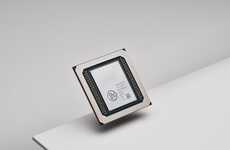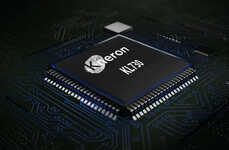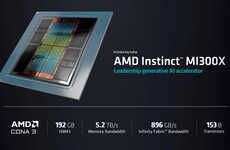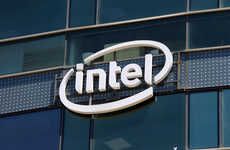This Light-Based Computer Chip is 15-Times Faster Than Electric Ones
Michael Hemsworth — December 27, 2015 — Tech
References: colorado.edu & damngeeky
As researchers continue to innovate in an attempt to find even more efficient ways to communicate and power smart technology, this Light-Based Computer Chip has been developed by a team of researchers from MIT, the University of California and the University of Colorado.
Rather than using electricity like all computer chips do, the Light-Based Computer Chip utilizes photonics instead to make data transfer speeds up to 15-times faster than previously capable. By using light instead of electricity, the chips are capable of being more energy efficient and streamlined.
The 3mm by 6mm Light-Based Computer Chip is capable of providing a bandwidth density of 300GBs per square millimeter, which means more power in less space.
The new chip technology could help to revolutionize the computer, smartphone and smart device market in paramount ways.
Rather than using electricity like all computer chips do, the Light-Based Computer Chip utilizes photonics instead to make data transfer speeds up to 15-times faster than previously capable. By using light instead of electricity, the chips are capable of being more energy efficient and streamlined.
The 3mm by 6mm Light-Based Computer Chip is capable of providing a bandwidth density of 300GBs per square millimeter, which means more power in less space.
The new chip technology could help to revolutionize the computer, smartphone and smart device market in paramount ways.
Trend Themes
1. Photonics-based Computing - The new Light-Based Computer Chip technology could pave the way for more energy efficient and faster communication through photonics-based computing systems.
2. Efficient Data Transfer - The utilization of photonics technology in computer chips could lead to more efficient data transfer and processing.
3. Miniature Chip Development - The development of a 3mm by 6mm Light-Based Computer Chip is indicative of the push toward miniature chip design to increase power and save space.
Industry Implications
1. Technology - The technology sector stands to benefit from the development of faster, more energy-efficient computing systems.
2. Consumer Electronics - The consumer electronics industry could take advantage of the energy-saving and miniature designs of photonics-based computer chips for developing faster and smaller smart devices.
3. Energy - Photonics-based computing systems could potentially reduce energy consumption in the technology industry, making it a possible disruptive innovation in the energy sector.
2
Score
Popularity
Activity
Freshness






















